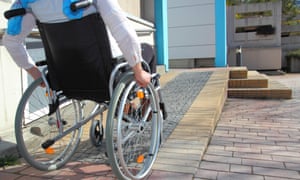
A wheelchair-user using a ramp. ‘It’s still often impossible for us to get in a building.’ Photograph: Alamy Stock Photo
The idea that we are different and don’t want to work, laugh in a pub, or go on a date is far too common. The result, for far too many, is stark isolation
Increasingly, I feel lucky to leave the house. That’s a strange feeling for someone to have, particularly someone in their early 30s. As a millennial, I know I should be concerned with my nonexistent pension or ever diminishing chance of buying a home – and I am, really. But as a disabled person, I’m aware that nowadays even basic parts of a normal life can’t be taken for granted: going to the office, meeting friends in the pub, even regularly seeing another human being.
New research from the disability charity Scope has found almost half of working-age disabled people are chronically lonely, saying they “always or often” feel lonely. Staggeringly, that works out at about 3 million lonely disabled people in Britain.
The Office for National Statistics has described Britain as “the loneliness capital of Europe” – finding that we’re less likely to have strong friendships or know our neighbours than inhabitants of any other country in the EU. Young people are said to be particularly affected.
Continue reading and be ashamed of our fellow human beings and, perhaps, take a long look at how we ourselves react to people who are less able than we are.
No comments:
Post a Comment